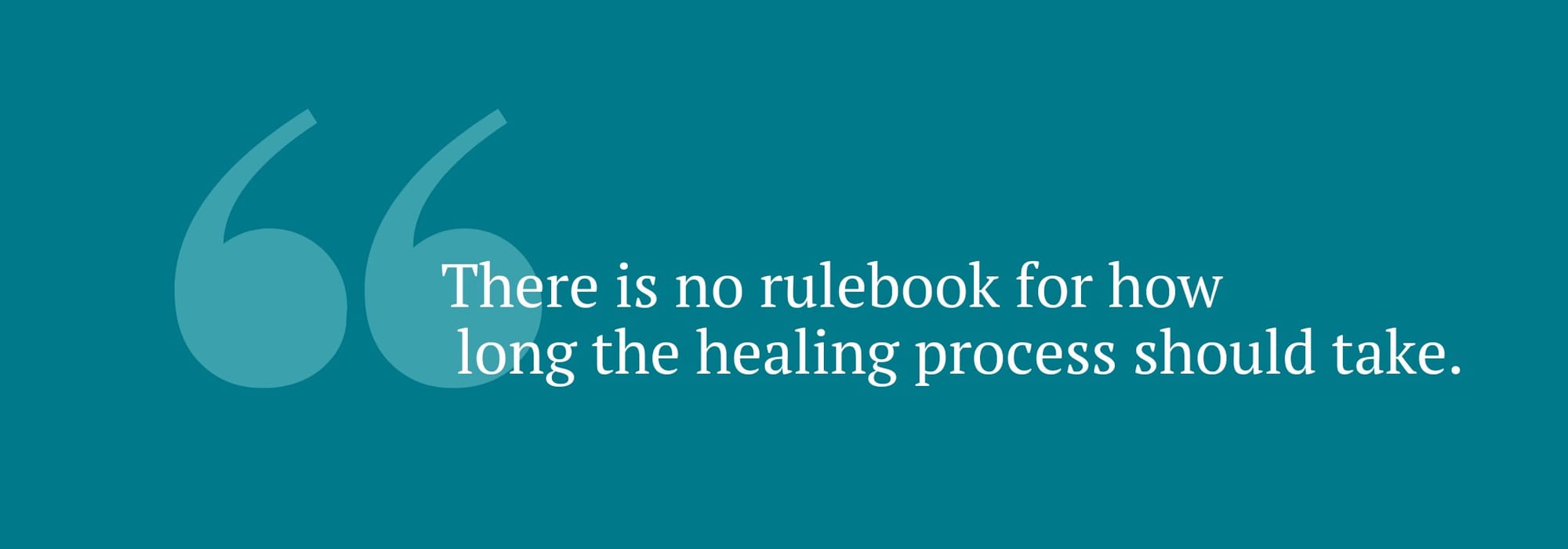There will never be a replacement for your other half, but meaningful companionship at a comfortable pace has the potential to help you heal
Grief is a normal, albeit painful, part of the human experience. But what happens when you lose the love of your life? Can there ever be a point at which you feel ready to love again?
Linda Aitchison from Wolverhampton knows exactly what it feels like to rebuild your life after the loss of a spouse. “In the hard years after Neil’s death, my twin daughters were my only priority and I shaped my life around them, isolated to my core,” explains Linda. “I was lonely — but lonely for no one else but Neil.”
When her daughters left for university, six years after losing her husband, Linda found herself confronting an unexpected emptiness. “I started online dating, was hit by loads of disasters, and then met my now partner Phill,” Linda explains. “He was a breath of fresh air.”
For Linda, six years felt right, but what if you want to start dating immediately? How long is too long, and when is too soon?
Mental health risk factors in losing a spouse
One systematic review, published in the journal Aging and Mental Health, found that the prevalence of major depressive disorder (MDD) and anxiety disorders were considerably elevated in widowed individuals, especially in the first year after losing a spouse.
While having a mental illness shouldn’t stop you from getting into a relationship, there are elements of dating that could interfere with your recovery. New partnerships can bring disruption to routines, habits, and existing friendships, all of which can contribute to a stable emotional landscape. While new love can be fun, flirty, and a welcome distraction, it can also come with potential judgement, communication issues, and conflict. Additionally, the time and energy required for a new relationship can be hard to muster during bereavement. All of this uncertainty can – but not always – exacerbate symptoms and cause further harm.
Honour your unique journey
This all points to the million dollar question: how do you know when you’re ‘ready’ to start a new relationship after losing your partner?
While there’s no perfect formula, there is one emotion that counsellor and certified grief educator, Phoebe Clausen-Sternwald works through with most of her grieving clients, and that’s guilt: “When people feel guilty for feeling joy or being in love again, I will invite them to explore that if it was the other way round, would they have wished their loved one to live a lonely and unhappy life? If the answer is no, then maybe it’s time to give themselves permission to live and love fully again.”
Phoebe also encourages her clients to investigate whether their guilt is a result of a perceived violation of an internal belief system, perhaps one that was instilled in them growing up. As an example, consider someone who was raised to believe that monogamy in relationships is the sign of a ‘good’ person. They may feel that dating after the loss of a partner counts as cheating, and makes them a bad person. This is a helpful observation to make because, as Phoebe reminds her clients, “Throughout our lives, we can choose to reevaluate our belief system at any time.”

Shame is also a very common experience. You may wonder what your partner would say if they were still around, worry what your in-laws will think, or be scared that your children will be upset. Phoebe suggests thinking about whose reactions matter most to you, then developing different ways to respond to them according to their personality and your relationship with them. When it comes to introducing a new partner to young children, Phoebe advises that this can be particularly challenging and can be made easier with the support of a child bereavement professional.
It’s natural to be wary of what others think, especially during a time of such heightened emotions when there’s no rulebook on how to make sense of it all. But remember, no one has walked in your shoes, and therefore no one has the right to judge your choices. When it comes to the reactions of random people, know that you can choose not to pay any attention. “People need to earn the privilege to hear your grief story,” says Phoebe. “The same principle applies to whether their reaction is worthy of your meaningful response.”
Another thing to consider is how much you’re willing to share about your grief with a potential new love interest. In particular, you want to feel as though you’re able to set and maintain personal boundaries. If you can’t do this, it might be a sign that you’re still in the processing phase. “When we see people who overshare their grief, it normally indicates that their grief hasn’t been witnessed enough,” says Phoebe. In this case, finding a loved one, support group, or qualified therapist, to hold space for your grief is essential.
The power of love
Grief is considered a stressor on the mind and body, but the good news is that forming strong emotional bonds with someone, when you’re ready, can have a profound impact on your wellbeing. One study, published in the journal Communication Monographs found that words of affection from a romantic partner lower stress hormone levels in healthy adults. Another study, published in Psychological Science, showed that the simple act of holding hands with a long-term, stable romantic partner lowers stress much more than other forms of hand-holding relationships.
Even if you’re not ready to get into a full-blown relationship with someone, dipping your toe into the dating world can provide a sense of connection that could help you heal. There are even dating sites specifically made for widows, which means you can connect with people who have a deeper understanding of what you’re going through.
That doesn’t mean that dating will be a breeze. As Linda recalls: “I was lacking in confidence when I first started online dating. I was too easily flattered by compliments from would-be dates, and said ‘yes’ more than I should, which led to sometimes comical, and often disastrous, encounters.”
But Linda was able to see this as part of her journey, and learned to value herself more and, importantly, take as much time as she needed. Now in a happy relationship with Phill, she’s in a new season of life. “We’ve been together six years and now live together. We love to travel and share adventures, living life to the fullest with concerts, long walks, weekends away, even kayaking together.”

Perhaps the hardest thing to come to terms with during this time is that no matter what happens in your future, no one will ever replace your partner. But maybe that’s something that will one day feel positive, because as author F Scott Fitzgerald wrote: “There are all kinds of love in this world, but never the same love twice.”


Comments